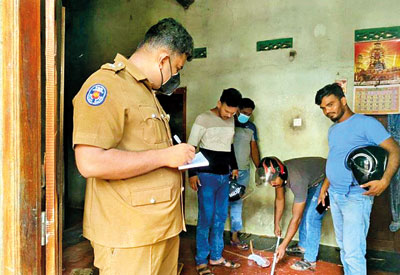News
Murder of disabled woman a disturbing sign of times
The tragic end of a 43-year-old disabled woman from Alangkudawa, Norochcholai who was beaten to death with a rod by her younger brother on Monday, was the latest in a spate of murders reported by police this year.
The brother assaulted his elder sister while she was sleeping after being scolded by their mother for coming home late at night, police said. The man was handed over to the police by neighbours.

Police at the scene of a homicide in Jaffna.
On April 4, a 19-year-old girl succumbed to stabbing injuries on admission to Dambulla Hospital. A man, who was her relative, had stabbed the girl while she was working in her bookshop. Police said the young girl is said to have helped the man’s under-age daughter start a love affair with another person.
Three other murders were reported in the past two months.
“This increase in homicides,” Senior Lecturer Nishani Ranaweera of Sri Jayewardenepura University’s Criminology and Criminal Justice Department said, “could be triggered by loss of income and jobs due to the pandemic.” There are no statistics to support this claim, but Ms Ranaweera warned inflation and loss of employment would come to be seen as factors leading to the rise in violence.
Professor Sarathchandra Kodikara of the University of Peradeniya’s Department of Forensic Medicine, said he believed police figures would show more than one homicide committed each day in the country, with most going unreported in the media. “There could be more than 30 homicides reported to police stations so far this year,” he said.
In 2019, 579 murders were reported, and the year before that, 489 homicides, Prof Kodikara said. While the figures for 2020 are yet to be published, he is of the view that the toll could be lower due to the lockdowns and movement restrictions last year.
A senior police officer, however, sounded a warning, saying: “The release of remand prisoners due to overcrowding in prisons could be a catalyst for more violence”.
Among other crimes reported in recent weeks, a father of two was killed by an ex-soldier in Kumbukgeyaya, Ethimale on March 17. The two men had been drinking together. The suspect later surrendered to police with the knife used in the attack.
A week earlier, another man died of knife injuries: Mohamed Azwan of Mullipuram, Puttalam, a 35-year-old father of three, who died after admission to the Puttalam Hospital.
Police said Azwan had been visiting his sister and had been caught in a fight between two parties over a longstanding dispute over pigeons. One group had stormed a house connected with another party and the ensuing brawl resulted in Azwan’s death and injuries to three others. The attackers are absconding.
Police said after an earlier fight two days earlier, the two parties had been summoned to the Puttalam Police Station and their quarrel referred to a Mediation Board.

The murder weapon. Pix by Romesh Madushanka
In another incident reported by Kilinochchi police, the body of a 27-year-old pregnant woman was found floating in the Ambalkulam Tank on March 9. A post-mortem examination revealed the woman, 37-year-old Arumugam Thilageshwari, had been hit on the head with a sharp instrument and strangled. She was six months pregnant.
Arumugam had been living with her three-year-old child in a rented room in Kurimidchipuram, Kilinochchi. She had asked the owner of the house to take care of her child while she visited the clinic at the Kilinochchi Hospital. When she failed to return home, police were informed. The next day, residents of Ambalkulam alerted police to the floating body of a woman later identified as Arumugam Thilageshwari. Police suspect the murder was carried out by a lover of the victim.
On January 25, a fisherman, Lakshan Perera, was killed in broad daylight in Pallimulla, Panadura while travelling in a three-wheeler with a suspected drug peddler who fled the scene.
On the same day, 24-year-old Ishan Tharindu was hacked to death by a gang of five near a petrol station in Meetiyagoda. One of his arms had been severed.
The killing that shocked the nation was the murder in late February of a young woman from Kuruvita whose headless body was found inside a suitcase left on a busy street in Colombo.
Senior Lecturer Ranaweera condemned the sensationalist coverage of this murder by some media, saying it was unprecedented, and in total disregard of media ethics.
“Showing what should not be shown, such as the headless body of the young woman who was killed in Kuruvita recently, lacks media ethics. The pictures went viral on social media,” she said.
“Fear protects us from carrying out crimes. Showing details of headless bodies inevitably conditions us into losing the fear of crimes,” she explained.
Media reports of crime has different impacts on age groups, she said, adding, “Prominently publishing the value of confiscated narcotics gives an indication of the magnitude of the cartel, but the different age groups consuming this news views the facts in different ways.”
Publishing photographs of mansions owned by drug lords could achieve the opposite effect of deterring people from entering the narcotics trade. The media was not focusing sufficiently on the message of shunning drug use or trafficking in drugs.
Ms Ranaweera also said the COVID-19 pandemic had upset perceptions of normality in society. “It does affect people’s behaviour,” she said. “We cannot expect people to behave normally as Covid-19 has cast its shadows on the economic, social and psychological spheres of our lives.”


